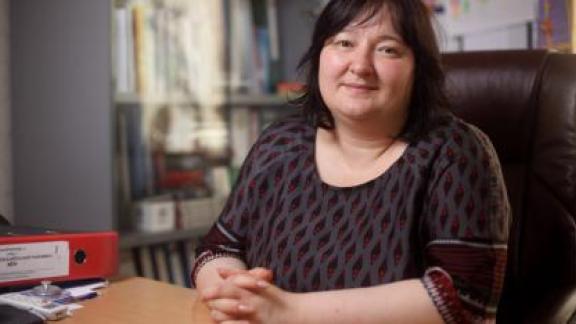“It felt like I was on trial,” says Galina Chirkina, the Executive Director of IPPF’s Member Association in Kyrgyzstan, the Reproductive Health Alliance (RHAK), about her experience at a Parliamentary hearing convened on 12 October 2013 to discuss the claim that her organisation was illegally engaging in “destructive activities”. These included distributing booklets on sexual and reproductive health (SRH) that allegedly contradicted Kyrgyz norms and traditions. Galina had been summoned to the hearing with less than 24 hours’ notice. The expert witnesses she had called the night before to join the hearing were refused entry. This was the latest move by conservative and religious forces in Kyrgyzstan to counter the promotion of SRH. Galina, one of the country’s leading SRH advocates, knew she was in for a very difficult day.
Years of build-up to the hearing
The Ministry of Health (MoH) welcomes RHAK’s work on healthy lifestyles and HIV prevention in youth-friendly MoH clinics throughout the country, and RHAK developed a set of booklets to respond to the needs of Kyrgyz youth, with support from UNICEF and Deutsche Gesellschaft für Technische Zusammenarbeit (GTZ). These booklets were widely used in governmental and non-governmental services throughout Kyrgyzstan, and were reprinted several times due to high demand.
But in the spring of 2013, trouble erupted when a campaign was launched against the booklets on the grounds that they were out of step with Kyrgyz cultural norms. Russian Orthodox and Muslim religious leaders partnered with conservative political parties to counter what they viewed as harmful “western” influence. Galina, always open to dialogue, proposed a meeting to discuss adapting the booklets but it was soon clear the opponents would fight to have the publications banned.
In September 2013, religious leaders publicly highlighted RHAK’s “destructive behaviour” and pledged to fight NGOs that promote lesbian, gay, bisexual, and transgender rights and what they called “pornography.” In the month that followed, RHAK was inspected by the police, the tax authorities and the internal security service. On 6 October, it held a conference for 120 of Kyrgyzstan’s leading experts, educators, civil society actors and governmental and religious officials concerned with SRH to discuss a way forward. The signatures of 650 leading health and human rights experts and activists as well as some government officials were gathered and addressed to the President, the Parliament and the executive agencies of the government, calling for action to support SRH in Kyrgyzstan.
The hearing
Galina faced a hostile presidium of Vice Ministers from key ministries, and members of the Parliamentary committee on education, culture and sport. However, shortly before the hearing began, Oleg Pankratov, the Advisor to the Prime Minister, unexpectedly entered the room to join the debate. He had been informed about the hearing by a lawyer working for RHAK, and understanding the gravity of the situation for the future of human rights and health in Kyrgyzstan, decided to attend the hearing and show his support, shaking Galina’s hand and sitting down beside her.
Over the next five hours Galina withstood aggressive accusations and was denied the opportunity to speak. The contents of the booklets were scrutinised and statements by religious organisations and conservative civil society groups were read out, proclaiming that the booklets were pornographic and would lead to degradation of Kyrgyz culture. RHAK’s work was condemned for corrupting young people and even spoiling the Kyrgyz gene pool. Tursunbai Bakir Uluu, who had organised book burning rallies ten years earlier, shouted at Galina, “I have burned your books and I will burn you!” Galina now felt a new kind of fear, not only for the future of SRH in her country, but for herself and for her family.
After the hearing – a difficult path ahead for sexual and reproductive health services
Galina exited the hearing to the cheers of supporters who had gathered outside the Parliament building. In the weeks that followed, the General Prosecutor’s office proceeded with an investigation, and RHAK was visited again by the police, the tax authorities and the internal security service. Not a single fault in its operations has been found.
RHAK has dodged a bullet for now, but a far larger fight lies ahead. While it has considerable support from Kyrgyz civil society, experts, the Ministry of Health, and even law enforcement agencies, local funding for SRH services is still not available. Donor funding for RHAK’s work is shrinking, while a greater proportion of financial support coming from sources in Russia and Muslim countries is happily used by those opposing RHAK’s work. If opposition to RHAK’s work on SRH gets stronger, then more than 40,000 young people in Kyrgyzstan will be at risk of losing access to its services.
when
country
Kyrgyzstan
Related Member Association
Reproductive Health Alliance of Kyrgyzstan









